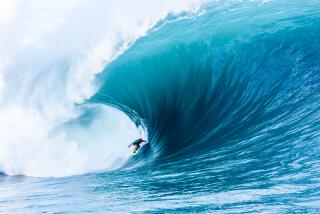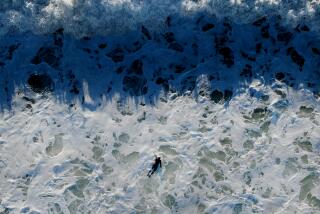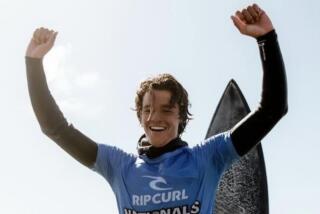All He Ever Needed Was a Break : Surfing: Supportive boss, top pro gave North Hollywood’s Jenkins the impetus to join the tour.
HUNTINGTON BEACH — Joey Jenkins has always broken new ground. Then again, there weren’t many professional surfers from North Hollywood to follow.
None, actually.
When Jenkins joined the world championship tour in 1989, he was the first from the inland locale he calls home. And in four years, his surfing has steadily improved to where he is now 13th in the world, though in the minds of sponsors he remains that guy from North Hollywood.
“I’ve definitely done it the hard way,” Jenkins said after dominating his 20-minute heat Friday to advance to the third round of the Op Pro Surf Championship.
In the water again Saturday, Jenkins led the heat for the first 15 minutes, then fell into third place (only the top two finishers advance). With a minute left, he caught the wave he needed and scored 5.33 on the judges’ 10-point scale. When the final buzzer sounded, he was in second place, .30 points ahead of the third-place finisher.
Jenkins, 26, learned to surf in Ventura where his family lived until he was 12. When his family moved to North Hollywood, he stopped surfing for a couple of years. In high school he found the desire again and hasn’t taken a break since.
“Before I joined the tour I used to drive from North Hollywood to Oceanside every day to surf because the break is like this,” Jenkins said, pointing to the Huntington Beach surf.
Although the two-hour, twice-daily drive was an inconvenience, it was nothing compared to his life in the months before. At one point, he worked 12-hour days selling specialty advertising products, attended evening classes at Valley College and continued to work on his surfing.
“I worked 6 a.m. to 6 p.m., then I’d drive straight here in dead traffic and paddle out around 8 or 9,” Jenkins said. “I’d surf under the lights on the pier until about midnight, drive home, catch a few hours of sleep and do it all again.”
Jenkins also was competing in amateur contests on the weekends and finishing high enough to crave tougher competition. His family and friends supported him all along, but the biggest boosts to his surfing career might have come from his boss first, and later, Sunny Garcia, the defending Op champion and a top-10 surfer on the world tour.
“My boss was a hockey player but he quit to start the company and always regretted quitting his sport,” Jenkins said. “It was a great job. But he said, ‘Don’t do it. Don’t quit surfing. Enjoy your youth.’ ”
Jenkins took his advice, quit that week and entered a contest in Oceanside. He wasted no time making his presence known.
“Sunny saw me surfing and said, ‘You should be on the tour,’ ” Jenkins said. “I said, ‘It sounds great, but. . . .’ ”
Although Hawaiian, Garcia is not your standard-issue surf star, either. He overcame a broken home and a drug addiction before attaining his lofty position on the world tour.
“Joey and I have a lot in common. His parents were divorced like mine and he grew up with his mom and grandparents, like I did,” Garcia said. For Garcia, encouraging Jenkins to surf the tour was not idle talk.
“I paid his way a couple of times and then I got him all my sponsors,” Garcia said. “He was so hyped to surf and I was so content, we really pushed each other.”
The first two years on the world tour, Jenkins improved his surfing and his competitive skills but finished 87th and 58th in the rankings. The next year, he moved up only one notch to 57th.
Those were the “low-budget years,” as Garcia refers to them. Before each event, Jenkins sold boards, wet suits and anything else to buy plane tickets to contests. Once he slept in a park in Durban, South Africa, and another night he shared a tent with Garcia.
In 1992, the Assn. of Surfing Professionals, which oversees the competition, decided to change the format of the world tour. Originally, the tour consisted of more than 20 open events.
Under reorganization a two-tiered system was created. The world qualifying series events remained open and would serve as a proving ground for up-and-coming surfers.
The world championship tour was restricted to the top 44 surfers and only 11 events. Each year, the top 28 finishers hold their places on the tour and the other 16 are filled from the qualifying series.
Jenkins finished 45th in 1992 but scrambled onto the 1993 tour courtesy of an invitation.
He finished 37th overall, which would not have guaranteed him a place this year.
Knowing he couldn’t count on a world-tour berth that way, Jenkins competed in qualifying events all year long as well. He finished 11th in qualifying points and returned to the world tour for another try.
“Joey gives 110 percent every time, and sooner or later it’s going to pay off,” Garcia said.
At the moment, Jenkins is 13th on both tours, but clearly he wants more. Paddling out before his heat Friday, Jenkins grabbed a wave at the opening buzzer. He scored one 6 and a couple of 5s while the other three surfers in his heat were finding 4s. He led from beginning to end, but when he left the water he was still not satisfied.
“I wasn’t surfing to my potential. Near the end I was doing a little better, but I’d like to do better tomorrow,” Jenkins said.
And Saturday, after advancing by the narrowest of margins, it was the same. “I’m not making any mistakes but I’m not surfing as explosively as I’d like to,” he said.
More than content with the life of a surfing professional, Jenkins has but two wishes--more from the sponsorship community and more from himself. And at least one he can count on.
“If I didn’t feel I was improving, I’d be long gone from this tour,” he said.
More to Read
Go beyond the scoreboard
Get the latest on L.A.'s teams in the daily Sports Report newsletter.
You may occasionally receive promotional content from the Los Angeles Times.










